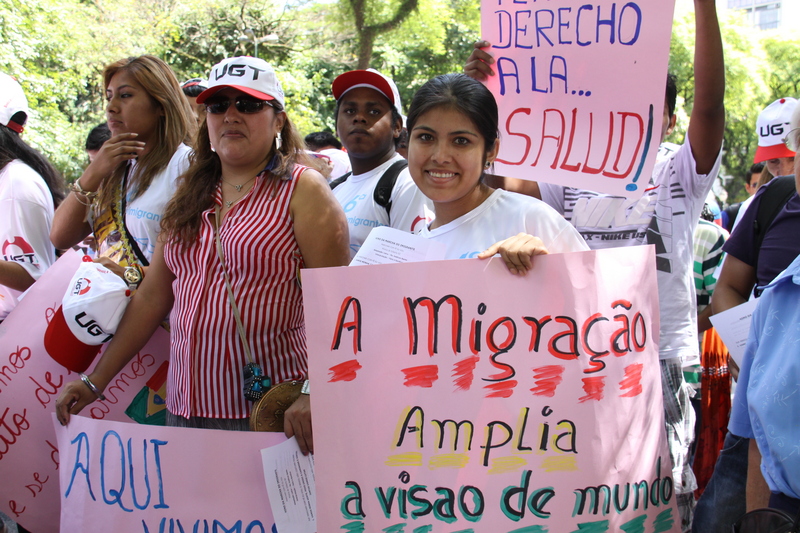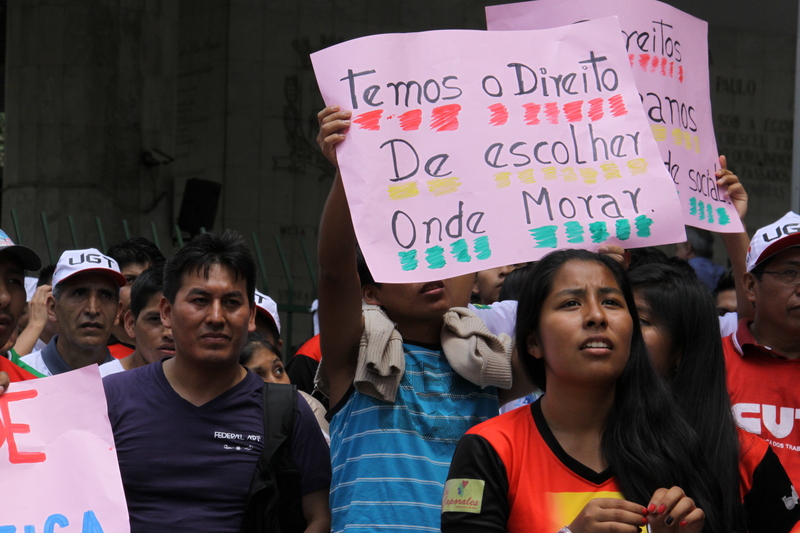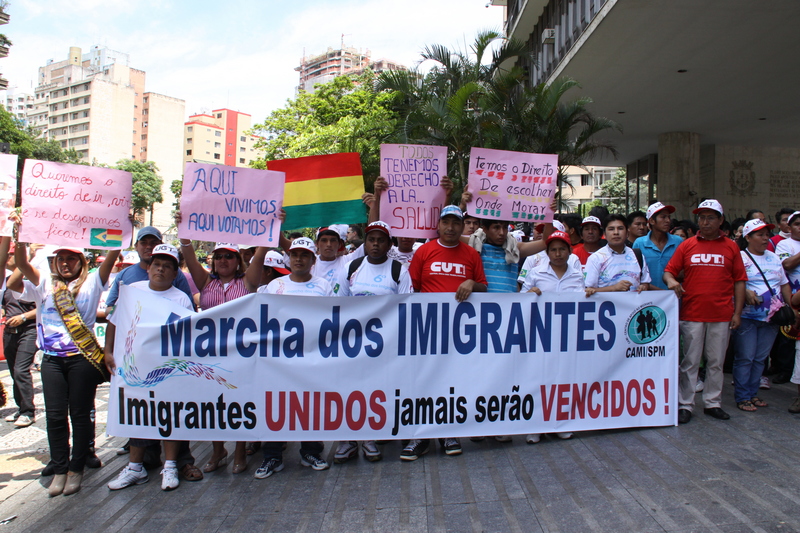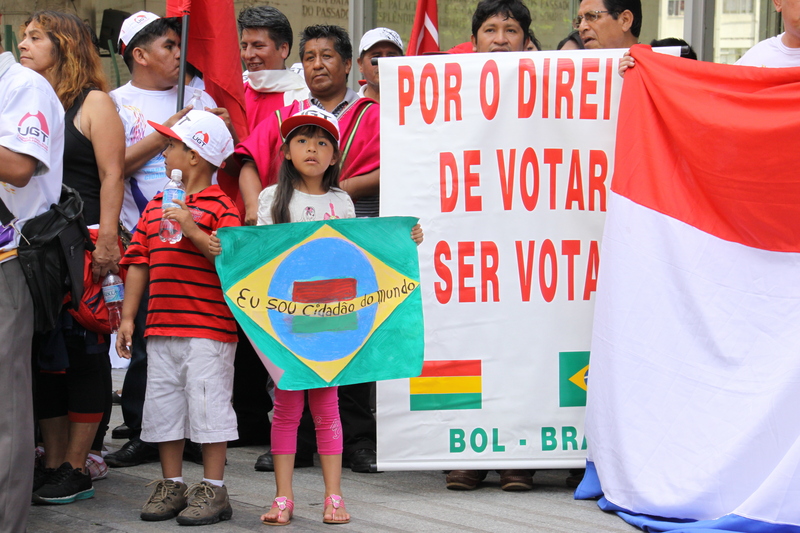On December 2, 2012, a protest organised by foreigners residing in São Paulo took to the streets demanding full access to basic rights such as health, security and decent work. The VI Immigrants’ March departed from the Praça da República in the city centre and passed in front of São Paulo's City Council, where its organisers halted the march for several minutes to make speeches.
The majority of the protestors were of Latin American and African origin, and live in the city where they are fighting to obtain the same rights as native Brazilian citizens. They are men, women and children who have fled poverty and insecurity in their countries of origin and who hope to make a new home for themselves in Brazil.
However, this dream frequently turns into a nightmare and these people end up facing many problems; it is difficult for them to obtain full access to justice due to their status as foreigners, especially when they are in an irregular legal situation. Some of these individuals, especially Bolivians, end up falling into networks which exist to exploit irregular foreign workers, making them work in slave-like conditions: with excessive working hours, salaries far below the legal minimum, lack of basic security and hygiene norms, and filthy and overcrowded accommodations.
The blog Pandora gives a good description [pt] of this silent yet violent situation experienced by many foreigners:
É muito difícil encontrar, na grande maioria dos bairros da capital paulista, imigrantes de origem boliviana. Porém, a cada dia que passa, o número de pessoas com traços indígenas e falantes de um espanhol mais arrastado que o normal só aumenta na cidade, quase que na surdina. Isso ocorre porque, normalmente, esses imigrantes se encontram nos bairros centrais da cidade – principalmente onde as roupas são mais baratas – enclausurados em fábricas, em condições insalubres de trabalho, ou vendendo seu artesanato em feiras. Esse é o panorama de mais de 200 mil bolivianos, imigrantes legais e ilegais, que vivem na cidade de São Paulo.
In the vast majority of São Paulo's districts, it is very difficult to find Bolivian immigrants. However, with each day that passes, the number of people in the city with indigenous features and a slower Spanish than usual continues to rise, almost in secret. This situation occurs because, usually, these immigrants are found in the central districts of the city – mainly where clothes are cheaper – locked up in factories in unsafe working conditions, or selling their craftwork at markets. This is the situation of more than 200,000 Bolivians, both regular and irregular immigrants, who live in the city of São Paulo.
The fact is that although Brazil is a country which was built using the strength of immigrants, the last great wave of foreigners to settle in the country did so at the beginning of the 20th century. Since then, numerous economic shocks caused the process to be reversed and Brazil came to be a country of emigrants. This situation led Brazilian politicians to lay aside the task of updating legislation relating to immigration, which dates to the era of the dictatorship, hindering the implementation of an agreement to allow the free movement of people and merchandise between member states of MERCOSUR, just like in the Schengen Area in the European Union.

“Migration broadens your vision of the world”. Photo by Juliana Spinola copyright Demotix (02/12/2012)
On this subject, the website O Estrangeiro (The Foreigner) republished an enlightening interview [pt] with the coordinator of the Centre for Human Rights and Immigrant Citizenship (CEDIC), Paulo Illes:
No Brasil especificamente, o Estatuto do Estrangeiro é extremamente discriminativo, notadamente pelo fato de ser produto dos anos de chumbo [o período mais repressivo da ditadura militar do Brasil], quando o estrangeiro era tratado como uma ameaça para a segurança nacional e neste quadro jurídico arcaico, marcado pelo autoritarismo e falta de democracia, toda a responsabilidade no tratamento ao migrante é da alçada da Polícia Federal.
In Brazil specifically, the Foreigners’ Statute is extremely discriminatory, primarily due to the fact that it is a product of the ‘years of lead’, [the most repressive period of the military dictatorship in Brazil], when foreigners were treated as a threat to national security, and in this archaic legal framework, characterised by authoritarianism and lack of democracy, all responsibility for the treatment of migrants lies with the Federal Police.
The emphasis placed by governments in the South American bloc on economic factors to the detriment of civil rights shows a little-discussed side of MERCOSUR, which in reality is a customs union rather than a political one. Brazil, for example, fears that once its borders are fully opened to its partners in the bloc huge numbers of citizens of the poorer countries will enter its territory, overburdening its institutions and economy.

“We have the right to choose where to live”. Photo by Juliana Spinola copyright Demotix (02/12/2012)
But this is not all. The Brazilian government is also concerned that the establishment of a system of free movement of people and merchandise may expose the country to security risks which it does not yet feel ready to confront. One example is the possible arrival of criminals who may take advantage of more flexible immigration legislation in neighbouring countries in order to settle in Brazil.
The case of Bolivia is even more complicated, since it is an associate not a member state of MERCOSUR, and its border is considered an important route for drug traffickers. Once inside Brazil, these new ‘immigrants’ would find a huge market for their products, not to mention the fact that they could use Brazilian ports and airports as platforms to export drugs to Europe and the USA.

Immigrants in Brazil take to the streets demanding their rights and improvements in immigration laws. Immigrants’ March in São Paulo. Photo by Juliana Spinola copyright Demotix (02/12/2012)
The path to establishing itself as a state of social justice is still long for Brazil, although it is an inevitable one. If the country wants to maintain peace in its cities and good relations with its neighbours, it will be obliged to think about integration and respect for the identities of migrants who have entered the country legally. At the same time, it is fundamental for it to maintain strict control over who enters the country: being a country which is fair and receptive to immigrants does not mean sheltering criminals.
Protests such as the Immigrants’ March show a step in the correct direction: making themselves known amongst native Brazilians, showing their faces, their accented Portuguese, where and how they live, their working conditions, and strengthening immigrant associations in order to demand their rights with regard to the law. And, finally, promoting awareness as Roque Patusso, coordinator of the Centre of Support for Immigrants (CAMI) points out in an interview [pt] published on the blog Bolívia Cultural:
Um dos avanços conquistados é uma consciência mais crítica do próprio imigrante, de que ele é o sujeito capaz de mudar alguma coisa. O que percebemos é que aumentou o número de pessoas na marcha, mas também a consciência das pessoas quanto aos seus direitos. Esse é o objetivo da marcha, conscientizar.
One of the most significant advances made is a more critical awareness in the immigrant himself, in which he is the agent capable of changing things. What we see is an increase in the number of people on the march, but also a greater awareness amongst these people with regard to their rights. That is the objective of the march, to raise awareness.








2 comments
“We have the right to choose where to live”.
You have the right to choose where to live, but that does NOT mean you have the right to stay in that nation which you entered without permission.
Brazil has it’s own poor people who deserve first attention. Bolivia must take care of it’s own people rather exporting it’s people who send back money.
We are all humans, but we are not one world, one people, on government. there are rules and each nation has it’s own culture and sovereignity which must be respected by each other.
The solution for Bolivia and Paraguay is simple. Improve your own conditions so that people do not have to leave. Brazil must do the same thing, allow it’s own citizens (born and naturalized brazilian citizens and legal residents) to improve the conditions first.